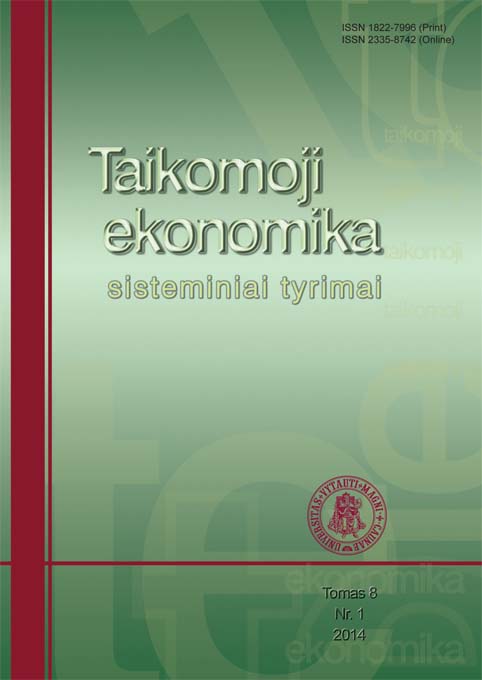Tiesioginių užsienio investicijų Lietuvoje pritraukimo veiksniai
Foreign direct investment determinants in Lithuania
Author(s): Algirdas Miškinis, Rūta SakalauskaitėSubject(s): Economy
Published by: Vytauto Didžiojo Universitetas
Keywords: Tiesioginės užsienio investicijos; TUI veiksniai; Gravitacijos modelis; Konkurencingumo reitingai, TUI perspektyvos; Foreign Direct Investment; FDI factors; Gravity model; Competitiveness ranking; FDI prospects
Summary/Abstract: Straipsnyje nagrinėjama investicinės aplinkos svarba tiesioginėms užsienio investicijoms (TUI) ir TUI svarba šalies ekonomikai. Ekonometriniais modeliais, tarptautiniais reitingais nustatoma TUI priklausomybė nuo makroekonominių veiksnių, įvertinamos TUI Lietuvoje perspektyvos. Foreign direct investment (FDI) flows are highly dynamic, but the factors of FDI flows are not fully determined in the process of globalization. Undoubtedly, foreign investment is a driver of economic growth. This constitutes the importance of the assessment of FDI factors and foreign capital opportunities. This article analyzes the importance of the investment environment for FDI and FDI importance for the economy, considers the main FDI theories, identifies key determinants and interferences of FDI. The aim of the research is to assess the investment environment, the factors of foreign capital inflows and to analyze the prospects of FDI in Lithuania. The analysis of scientific research papers made it possible to focus precisely on the most important aspects of FDI. The information of statistical databases provided opportunities to substantiate FDI dynamics and its factors. Literature analysis identified the essence of FDI and the main economic theories: the production cycle, exchange rates and imperfect capital markets, internalisation (domestic distribution), and Dunning eclectic paradigm. Theories have different approaches to the problems arising from the movement of capital between countries and the prospects of international investment. They also analyze the relation of FDI to legal, institutional, political environment, international organizations, competition, operating costs, economic growth, cultural differences, macroeconomic situation. Literature also indicates the impact of FDI on the receiving country‘s economy. In general, it was found that the recipient country‘s gains exceed the negative impacts, and the increasing volume of FDI increase the incentives for economic growth. Economic growth promotes further capital growth. Scientific analysis made it possible to focus on the most important aspects of FDI in Lithuania. Thus, the empirical part of the research, the analysis of FDI dependence on various macroeconomic factors is based on comparative statistical methods and econometric models. FDI in Lithuania is also assessed with regard to activities, investing countries. Undoubtedly, the methods used in the research are particularly important because they determine the results. The study uses the following methods: abstract, systematic comparative, logical analysis, analytical - critical method, correlation, regression analysis and cross-sectional models. The economic environment is assessed using investment attractiveness ratings which are broadly recognised by the international community. FDI in Lithuania is assessed using the gravity model. It should be noted that the FDI gravity model has not yet been applied in Lithuania.
Journal: Taikomoji ekonomika: sisteminiai tyrimai
- Issue Year: 8/2014
- Issue No: 1
- Page Range: 31-49
- Page Count: 19
- Language: Lithuanian

